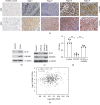CD147 Expression Is Associated with Tumor Proliferation in Bladder Cancer via GSDMD
- PMID: 32149134
- PMCID: PMC7054768
- DOI: 10.1155/2020/7638975
CD147 Expression Is Associated with Tumor Proliferation in Bladder Cancer via GSDMD
Abstract
Purpose: CD147, also known as BSG, is a type I transmembrane glycoprotein that belonged to immunoglobulin superfamily. Mature CD147 is an N-linked glycosylated protein and exists on the transmembrane and as soluble forms in tumors. However, the function of CD147 in cell proliferation of bladder cancer (BC) remains to be elucidated.
Methods: The study included 159 patients with BC and 68 healthy controls. The expression of CD147 and gasdermin D (GSDMD) was analyzed by immunohistochemistry (IHC). Western blotting was performed to detect the expression of proteins in BC cells. The relationship between CD147 and GSDMD was analyzed by the IHC score.
Results: The expression of CD147 was significantly increased in BC when compared to healthy controls, and the level of CD147 was correlated with tumor proliferation characterized by Ki-67, which is a cell proliferation antigen. In addition, CD147 treatment of BC cells increased the expression of GSDMD, leading to increased Ki-67 expression, while CD147 blockade with peptide in BC significantly reduced GSDMD expression, resulting in reduced cell proliferation. Furthermore, overexpression of GSDMD markedly overcame the inhibitory effect of CD147 peptide on tumor proliferation. BC patients with overexpression of CD147 showed correlation with GSDMD and demonstrated significantly poorer prognosis and overall survival rate.
Conclusion: These findings suggested that high expression of CD147 contributed to tumor proliferation in BC via GSDMD, which might in turn act as an unfavorable prognostic marker.
Copyright © 2020 Junming Peng et al.
Conflict of interest statement
The authors declare that there are no conflicts of interest regarding the publication of this paper.
Figures



Similar articles
-
CD147 overexpression is a prognostic factor and a potential therapeutic target in bladder cancer.Med Oncol. 2011 Dec;28(4):1363-72. doi: 10.1007/s12032-010-9582-4. Epub 2010 May 28. Med Oncol. 2011. PMID: 20509007
-
Kinesin family member C1 accelerates bladder cancer cell proliferation and induces epithelial-mesenchymal transition via Akt/GSK3β signaling.Cancer Sci. 2019 Sep;110(9):2822-2833. doi: 10.1111/cas.14126. Epub 2019 Jul 23. Cancer Sci. 2019. PMID: 31278883 Free PMC article.
-
CD147 expression as a clinicopathological and prognostic indicator in breast cancer: a meta-analysis and bioinformatics analysis.BMC Cancer. 2024 Nov 20;24(1):1429. doi: 10.1186/s12885-024-13202-9. BMC Cancer. 2024. PMID: 39567919 Free PMC article.
-
CD147-CD98hc complex contributes to poor prognosis of non-small cell lung cancer patients through promoting cell proliferation via the PI3K/Akt signaling pathway.Ann Surg Oncol. 2014 Dec;21(13):4359-68. doi: 10.1245/s10434-014-3816-1. Epub 2014 Aug 2. Ann Surg Oncol. 2014. PMID: 25084765
-
The biological function and clinical utilization of CD147 in human diseases: a review of the current scientific literature.Int J Mol Sci. 2014 Sep 29;15(10):17411-41. doi: 10.3390/ijms151017411. Int J Mol Sci. 2014. PMID: 25268615 Free PMC article. Review.
Cited by
-
GSDMD is associated with survival in human breast cancer but does not impact anti-tumor immunity in a mouse breast cancer model.Front Immunol. 2024 Aug 19;15:1396777. doi: 10.3389/fimmu.2024.1396777. eCollection 2024. Front Immunol. 2024. PMID: 39224600 Free PMC article.
-
Biomarkers expression among paired serous ovarian cancer primary lesions and their peritoneal cavity metastases in treatment-naïve patients: A single-center study.Cancer Med. 2022 Jun;11(11):2193-2203. doi: 10.1002/cam4.4600. Epub 2022 Feb 25. Cancer Med. 2022. PMID: 35212471 Free PMC article.
-
Regulated Cell Death in Urinary Malignancies.Front Cell Dev Biol. 2021 Nov 12;9:789004. doi: 10.3389/fcell.2021.789004. eCollection 2021. Front Cell Dev Biol. 2021. PMID: 34869390 Free PMC article. Review.
-
Gasdermin D-mediated pyroptosis: mechanisms, diseases, and inhibitors.Front Immunol. 2023 May 18;14:1178662. doi: 10.3389/fimmu.2023.1178662. eCollection 2023. Front Immunol. 2023. PMID: 37275856 Free PMC article. Review.
-
Eyes on coronavirus.Stem Cell Res. 2021 Mar;51:102200. doi: 10.1016/j.scr.2021.102200. Epub 2021 Jan 27. Stem Cell Res. 2021. PMID: 33535156 Free PMC article.
References
-
- Nabeshima K., Iwasaki H., Koga K., Hojo H., Suzumiya J., Kikuchi M. Emmprin (basigin/cd147): matrix metalloproteinase modulator and multifunctional cell recognition molecule that plays a critical role in cancer progression. Pathology International. 2006;56(7):359–367. doi: 10.1111/j.1440-1827.2006.01972.x. - DOI - PubMed
MeSH terms
Substances
LinkOut - more resources
Full Text Sources
Medical
Miscellaneous

